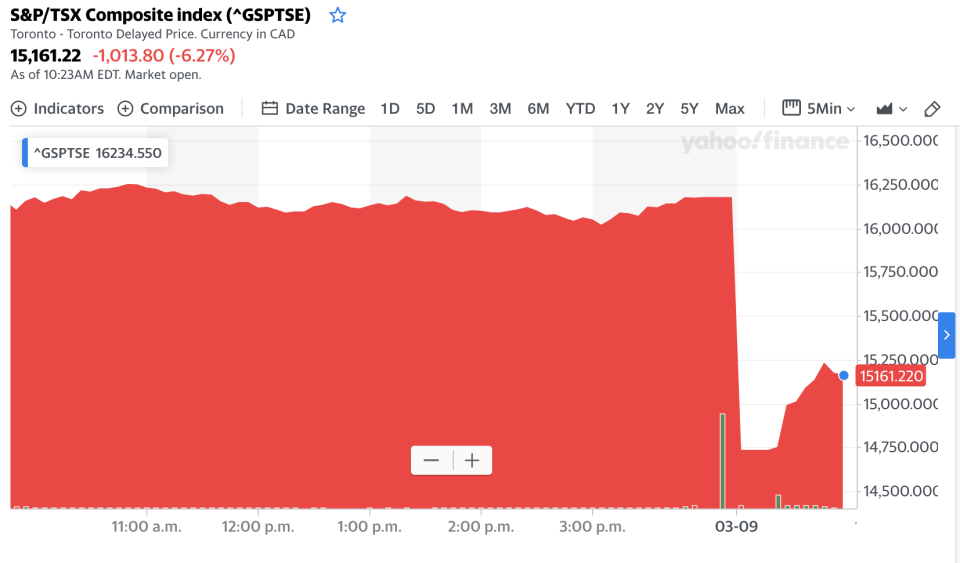TSX plunges as much as 10%, prompting trading halt

The Toronto Stock Exchange ended Monday’s brutal trading session down more than 10 per cent as a collapse in oil prices and ongoing concerns about the coronavirus outbreak pummelled stock markets around the world.
The S&P/TSX Composite Index (^GSPTSE) fell 1,660.78 points to 14,514.24 when the markets closed on Monday. The decline marked the biggest drop since October 1987, according to Bloomberg.
Trading on the TSX was paused shortly after markets opened, as the dramatic stock drops triggered the first level of circuit breakers that are designed to slow trading. Trading resumed at 9:50 a.m. ET.
LEVEL 1 MARKET-WIDE CIRCUIT BREAKERS TRIGGERED: At the instruction of IIROC, TSX, TSXV and TSX Alpha have been halted due to the triggering of a level 1 market-wide circuit breaker. Markets are now in Pre-Open state and are set to resume trading at 09:50:00
— TMX Group (@TMXGroup) March 9, 2020
The global market plunge came as the price of oil collapsed due to a price war launched by Saudi Arabia. Saudi Arabia slashed its official selling prices and announced plans to ramp up production after Russia refused to make output cuts proposed by the organization of Petroleum Exporting Countries (OPEC) over the weekend.
Canadian energy stocks have been hit hard by the oil price decline, with the S&P/TSX Capped Energy Index falling about 20 per cent on Monday. West Canadian Select crude fell to US$22.05 per barrel as prices for the North American and global benchmarks also tumbled. Cenovus Energy (CVE.TO)(CVE) was among the hardest-hit Canadian producers, with shares dropping more than 51 per cent on Monday.
‘This is a crisis’
The oil price collapse has exacerbated fears over the economic impact of COVID-19, which has already been weighing on global markets.
“This is a crisis. It is a crisis of confidence and people are afraid,” said Benj Gallander, president of the Contra The Heard Investment Letter, in an interview.
“We’ve got all kinds of factors that are going to restrain economic output.”
Travel-related stocks have also taken a substantial hit amid growing uncertainty about COVID-19, known as the coronavirus. Air Canada’s (AC.TO) stock dropped as much as 13 per cent on Monday before closing at $30.31, a decline of nearly 9 per cent. Shares of the airline were as high as $52.09 in mid-January. Travel and tour operator Transat A.T. Inc. (TRZ.TO) closed down nearly 10 per cent.
More than 105,000 people around the world have been infected with the coronavirus as of March 8, according to the World Health Organization. Nearly 3,600 people have died of the virus, with 3,100 deaths occurring in China. So far 101 countries have reported cases of COVID-19.
Given the uncertainty surrounding the outbreak of COVID-19, CIBC analyst Ian de Verteuil said now is not necessarily the time to buy stocks.
“Until we have greater clarity on the economic ramifications of the coronavirus, we continue to suggest investors remain cautious, resisting the urge to buy on equity dips,” de Verteuil wrote in a note to clients.
“There will be supply disruptions as a result of COVID-19. These all add up to a very murky outlook for business profitability. Until this clears somewhat, equities will continue to be volatile.”
Federal budget to address COVID-19
The federal government is expected to release its budget by the end of the month. Finance Minister Bill Morneau said Monday that Canada is in a “very strong fiscal position” to deal with the uncertainty surrounding COVID-19, as well as the oil price decline.
“Obviously people are quite anxious looking at the changes in the stock market today,” Morneau said.
“The Canadian economy has produced significant benefits over many years and one of them is that we have a level of debt as a function of our economy that is very low. It provides us with fiscal capacity to deal with challenges, to help people today and to help our economy tomorrow.”
But Gallander said the government has limited tools to stimulate the economy at this point.
“The difficulties are that the government doesn’t have the defences now because the debt is so high, the deficit is so high, and interest rates are already so low,” he said.
“That’s going to exacerbate the situation.”
With files from Reuters
Download the Yahoo Finance app, available for Apple and Android and sign up for the Yahoo Finance Canada Weekly Brief.

 Yahoo Finance
Yahoo Finance 
